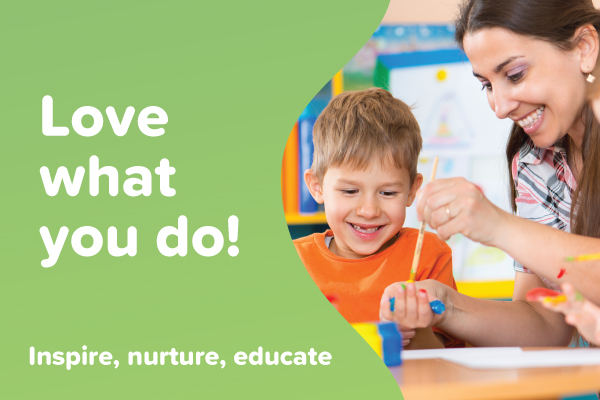If you recently completed secondary school and didn’t quite get the ATAR score you were hoping for, you might be feeling a bit lost as you decide what to do next.
A career in education and teaching might be your dream job, but you may not have achieved the score you need to get into a university degree just yet. If it feels like you don’t have options, don’t worry!
Even if you didn’t get into university the first time around, there are plenty of alternative pathways to a career or further study in teaching and early childhood education.

Alternative pathways to pursue an education career
For many year 12 graduates, a career in teaching looks like a rewarding and enjoyable path. It’s an opportunity to make a difference in the world, to interact with and inspire the future’s bright young minds. You may feel dismayed about your ATAR and not getting into your chosen university degree, but your journey into an education career doesn’t have to stop there. There are many options to explore, and many ways to reach your goal of obtaining a Bachelor degree.
With vocational education, you can take an alternative pathway to tertiary education. Plus, it can have many benefits, providing you with rewarding opportunities to expand your experience and knowledge of the sector as you work and learn. Whether you’re passionate about education, love working with children, or can see yourself as an inspiring leader in the classroom, your journey toward your dream career starts here.
Creating a pathway to fulfil your career dreams
When it comes to career progression, there’s never a single way to do it. Studies have shown that the average Australian will go through five to seven career changes in their working life, which means there are lots of different pathways to finding a career you love. While it might seem like a lot of time and effort, choosing an alternative pathway toward a degree in education actually has a range of benefits, including:
- Providing you with time to decide if a career in teaching is right for you
- Rewarding opportunities for working with children and young people
- Vocational training culminates in nationally recognised qualifications
- Valuable experience and practical skills that you can only get from working in the sector
- The choice to complete your training online or within a workplace training mode
- The ability to earn income while progressing toward your education degree
When considering an alternative pathway toward a degree in education, it can be helpful to have a good understanding of what it involves. Life after school can be quite different, but choosing an alternative pathway means that we’ll support you as you ease into working and learning as an adult.
Getting started with a Certificate III
Getting started on your journey toward a degree in teaching begins with a Certificate III in Early Childhood Education and Care (CHC30121). This recently updated qualification covers the fundamentals of early childhood development, education and care, and will take you around 12 months to complete. It can be undertaken online or within a workplace training mode, and will provide you with the qualification you need to progress toward that university degree. What’s more, upon completion you’ll be able to work in early childhood education anywhere in Australia.
Beginning your journey with a Certificate III will provide you with entry-level skills and valuable experience in the sector. You will develop a basic understanding of early education and development. It will prime you for further learning and employment, providing you with opportunities to upskill and broaden your experience.
Most importantly, it will give you a fundamental appreciation for early learning, setting you up for a fulfilling career. At the end of your certificate, you will be able to work as an early childhood educator, kindergarten assistant or after-school care educator, or as a nanny and in family day care centres.
Working on your skills in education
Early-career educators need to have a range of interpersonal and transferrable skills in order to become inspiring teachers and leaders. Once you’ve started out, it might be a good idea to set some goals for developing your skills. The early childhood education sector provides many opportunities for developing your capability and experience, in ways that make a genuine difference each day. This might look like becoming a room leader, or honing the adaptive skills required to constructively nurture and support young learners as well as progress your career. Whatever it is, we’ll be able to support you along the way.
Moving on up with a Diploma
The next step toward enrolling in that university degree is to undertake a Diploma level qualification. This will enable you to further progress your learning and development, while providing you with a higher level qualification for work in the sector. The CHC50121 Diploma of Early Childhood Education and Care. is a highly sought after qualification, providing graduates with the knowledge and skills needed to become leaders in their field. Upon completion of the Diploma you will be offered a pathway to studying a Bachelor degree at Swinburne University.
With a Diploma under your belt you’ll be eligible for a range of employment outcomes, such as:
- Room leader/Lead educator
- Early childhood educator
- Family day care educator
- Kindergarten assistant
- Centre or Assistant Director
A fast-tracked journey to a Bachelor Degree
Graduates of the Diploma of Early Childhood Education are eligible to fast track their learning through a pathway to the Bachelor of Education at Swinburne University. Upon completion of the Diploma you will be offered a pathway to Swinburne Online and given credit recognition toward a Bachelor of Education in either Early Childhood Education or Early Childhood and Primary teaching. This means you’ll be able to use credits to speed up your progress. You’ll also save on tuition fees by entering into the second year of a Bachelor degree, all while studying in a supportive and engaging environment. Studying online can have a range of benefits, including flexibility and balancing study with life’s other commitments.
Both the Bachelor of Early Childhood Education and the Bachelor of Early Childhood and Primary teaching are fully accredited by Swinburne University and Technology and the Australian Children’s Education and Care Quality Authority (ACECQA), with the dual qualification additionally accredited by the Victorian Institute of Teaching (VIT) and the Australian Institute of Teaching and School Leadership (AITSL).
Once you’ve completed your degree, you’ll be able to teach in a range of Early Childhood and Primary settings, including children’s centres, kindergartens and preschools, as well as public and independent primary schools across Australia.
Find out more about fast-tracking your career.
Empower your future
You ATAR doesn’t have to determine your career, and there are many ways of progressing toward your dream job in education.


